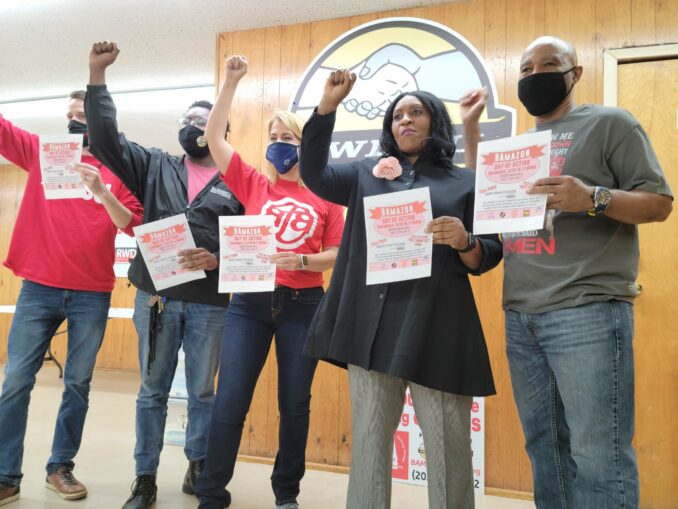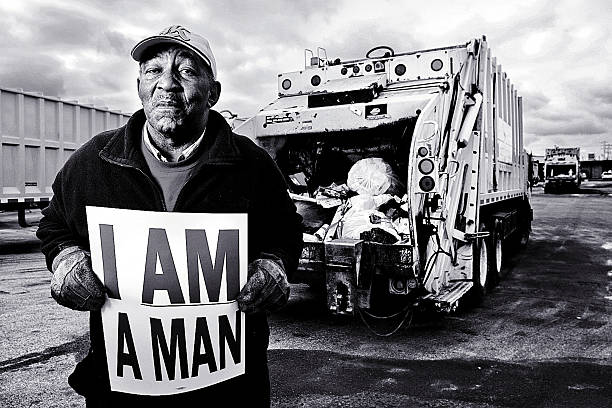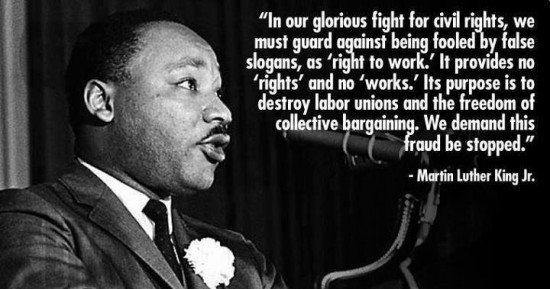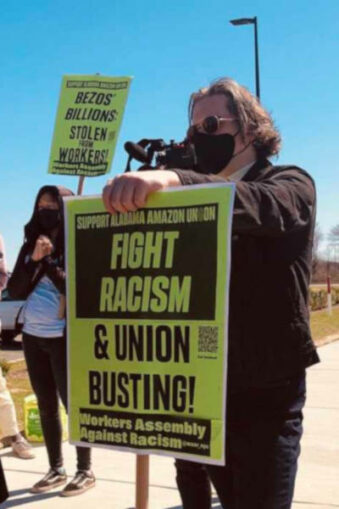In the spirit of Dr. Rev. Martin Luther King, Jr., Bessemer workers fight for justice
A historic union election concluded March 29 after 5,800 Amazon warehouse workers, over 80% of them African American, voted on whether to be represented by the Retail, Warehouse and Department Store Union in Bessemer, Ala., near Birmingham. It could take weeks or even months before the outcome of the vote becomes official.

Alabama Amazon warehouse workers with Sara Nelson (center), international president of the Association of Flight Attendants-CWA, and local worker leader, Jennifer Bates (second from right), at the RWDSU hall in Bessemer, March 17.
If the majority vote is yes, this will be the first union of Amazon workers to be organized inside the U.S. But whether the Bessemer workers win or lose the election, their attempt to unionize within one of the largest privately owned corporations in the world will inevitably cause a domino effect in worker organizing, not only for 1 million Amazon workers to organize in the U.S., but for workers in other industries, be they full-time or part-time, to organize as well.
(tinyurl.com/z436k92j)
What is happening in Bessemer is having tremendous international implications. On March 22, Amazon workers throughout Italy, organized by three unions, called a one-day strike that galvanized 30-40,000 workers and impacted Amazon’s entire logistics chain in the country. And workers in Germany have called a four-day strike before April 4 at six Amazon sites to force the conglomerate to recognize collective-bargaining agreements.
An important impetus for the Bessemer Amazon workers, besides demanding better working conditions and pay, has been the COVID-19 pandemic. It has been reported that over 20,000 Amazon workers have contracted the virus due to unsafe working conditions inside the company’s warehouse and distribution centers.
When a corporation like Amazon nets a profit of over $386 billion in 2020 — an increase of 38% from the year before — and its CEO and founder Jeff Bezos is worth $186 billion, there is no excuse for any worker to be exposed to COVID in any Amazon plant, except for corporate capitalist greed and callous disregard for the workers’ well-being.
Dr. King and the 1968 strike
April 4 will mark the 53rd anniversary of the assassination of the Rev. Dr. Martin Luther King Jr. in 1968. Just days before he was shot on the balcony of his room at the Lorraine Motel in Memphis, Tenn., King had supported the strike of 1,300 Black sanitation workers at the Memphis Department of Public Works, who were demanding safe working conditions and better pay. These workers made a slave wage of 65 cents an hour.
What precipitated the Feb. 12, 1968, strike was that two sanitation workers, Robert Walker and Echol Cole, were crushed to death Feb. 1 by a malfunctioning truck they were working on. The city refused to compensate the families for their avoidable deaths.

Sanitation workers’ strike, Memphis, Tenn., 1968.
The strike might have been averted if the racist mayor of Memphis, Henry Loeb, had endorsed the resolution passed by the local city council recognizing the workers’ right to be organized by AFSCME. Instead Loeb overruled the vote, which led to the strike. The Memphis police brutally attacked the strikers that Feb. 23.
Dr. King had hoped to announce a citywide work stoppage in March to include workers and students in solidarity with the sanitation workers, but a snowstorm thwarted that effort, along with political factors.
Speaking before a mass gathering of 25,000 civil rights leaders and labor leaders in Memphis that March 18, King told them: “You are demonstrating that we can stick together. You are demonstrating that we are all tied in a single garment of destiny, and that if one Black person suffers, if one Black person is down, we are all down.” (tinyurl.com/66wjj45w)

The night before his assassination April 3, King made his famous “I’ve been to the mountaintop” speech. On April 16, after his death, the strike ended with a tentative deal between AFSCME and the city.
King had hoped that the success of the Memphis strike would be a springboard for his national Poor People’s March campaign — to link the ongoing struggle for civil rights with the struggle against poverty and for economic justice. But his murder brought this effort to an abrupt halt.
From Memphis to Bessemer: same struggle, same fight
Despite his bourgeois, pacifist and nonviolent views, Dr. King was willing to give his life to all aspects of social justice from civil rights to workers’ rights. He understood that you can’t have one freedom without the other. Dr. King was expanding his political outlook beyond the U.S. when he criticized the criminal, imperialist U.S. war in Vietnam.
In his powerful “Beyond Vietnam” speech given April 3, 1967, at Riverside Church in New York City, Dr. King stated, “The bombs in Vietnam explode at home” in relation to growing poverty in the U.S.
If Dr. King were alive today and physically able, he would be in the streets with Black Lives Matter fighting against police brutality and white supremacy.
Starting in 1955, Dr. King began his political activism with being the most visible spokesperson for thousands of Black people, who collectively participated in the Montgomery Bus Boycott to end racist segregation on the buses, where Black riders were relegated to the back of the bus at the behest of white riders. As Black people showed their power by walking to work every day for a year and organizing their own car pools, they not only defeated this local segregation edict but ignited the modern day Civil Rights Movement.
A next big step happened 10 years later with the Selma to Montgomery march in March 1965 to demand voting rights for Black people. After the vicious beatings and murders of martyrs such as Jimmy Lee Jackson, Viola Liuzzo and Rev. James Reeb, the racist President Lyndon Baines Johnson was forced to sign into law the Voting Rights Act three months after the march and other mass protests.
This bourgeois democratic right to vote is now being challenged once again by mainly right-wing Republican forces, who seek more and more voter suppression amongst Black people and other people of color in Georgia and elsewhere.

Staten Island, N.Y. rally for Bessemer workers organized by Congress of Essential Workers and fired Amazon worker Chris Smalls, March 30.
Today, Dr. King’s voice would be among the loudest to show solidarity with the Bessemer Amazon workers’ right to organize. He would uplift the leadership role of Black workers against the racism they face on the part of white managers and owners at Amazon, and he would speak for the right to unionize for all workers, which has always been a challenge in the U.S. South.
The Bessemer Amazon workers would have had an important friend and ally in Dr. King, based on his heroic legacy of struggle for the most oppressed workers.

